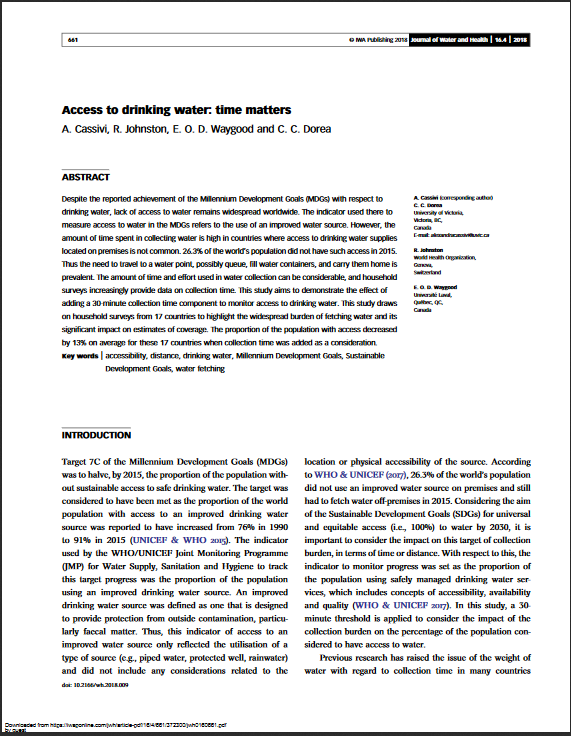Access to drinking water: time matters
 |
article Jun 2018 ; 6 pages
Aut. Richard Johnston & Caetano Dorea & Alexandra Cassivi & Owen Waygood
Ed. IWA - London WHO - Genève
Téléchargeable sous format: PdF
Téléchargeable chez l'éditeur
Page de présentation d'un éditeur
Résumé:
L'étude vise à démontrer l'effet de l'ajout d'une durée de collecte de 30 minutes pour surveiller l'accès à l'eau potable. Cette étude s'appuie sur des enquêtes auprès des ménages de 17 pays pour mettre en évidence la charge très répandue de la corvée d'eau et son impact significatif sur les estimations de la couverture Abstract:
Despite the reported achievement of the Millennium Development Goals (MDGs) with respect to drinking water, lack of access to water remains widespread worldwide. The indicator used there to measure access to water in the MDGs refers to the use of an improved water source. However, the amount of time spent in collecting water is high in countries where access to drinking water supplies located on premises is not common. 26.3% of the world’s population did not have such access in 2015. Thus the need to travel to a water point, possibly queue,fill water containers, and carry them home is prevalent. The amount of time and effort used in water collection can be considerable, and household surveys increasingly provide data on collection time. This study aims to demonstrate the effect of adding a 30-minute collection time component to monitor access to drinking water. This study draws on household surveys from 17 countries to highlight the widespread burden of fetching water and its significant impact on estimates of coverage. The proportion of the population with access decreased by 13% on average for these 17 countries when collection time was added as a consideration.
Publics-Cibles:
Mot clef: |
Editeurs/Diffuseurs: |
|
IWA
-
International Water Association - London - Royaume Uni |
WHO
-
World Health Organization - Genève - Suisse |
En cas de lien brisé, nous le mentionner à communication@pseau.org